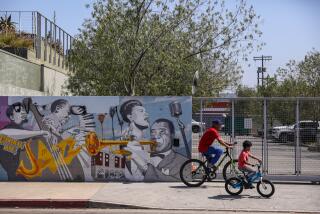L.A. and N.Y.: Two new mayors but two different agendas
- Share via
New York and Los Angeles have a lot in common. Each city suffers from income polarization, a shrinking middle class and a vast low-wage service sector. Each is heavily Democratic and is home to an effective labor-liberal political alliance. Each elected a progressive Democrat as its mayor.
So why are the agendas of the two cities’ mayors shaping up so differently?
Part of the reason is the elections that brought them to power. The issues that loomed largest in the two cities’ mayoral contests could scarcely have been more different. In New York, Bill de Blasio’s emphasis on raising taxes on the rich to fund preschool, providing workers with paid sick days and ending racially discriminatory stop-and-frisk police practices dominated the civic discourse. In Los Angeles, the race between Democratic mayoral candidates Eric Garcetti and Wendy Greuel featured no such discussions — or, consequently, electoral mandates.
De Blasio, of course, was positioning himself against an ascendant civic plutocracy personified by outgoing New York Mayor Michael Bloomberg, while Garcetti and Greuel had few if any ideological differences separating them from outgoing Mayor Antonio Villaraigosa or, for that matter, each other. Once installed in office, both De Blasio and Garcetti have backed measures to help their cities’ working poor — De Blasio supporting an extension of the city’s paid sick-day ordinance to more workers, Garcetti backing a proposal to raise the wages of employees of large hotels to $15 an hour.
So does it really matter that De Blasio and Garcetti came to power through fundamentally different campaigns? I think it does, because those campaigns reflected the differences between the two cities’ progressive power centers and their capacity to promote social change.
In Los Angeles since the mid-1990s, a vibrant labor movement has also become the leading vehicle for politically mobilizing the city’s increasingly Latino working class. It is the dominant force in district elections in such communities. Working with the Los Angeles Alliance for a New Economy (LAANE), it has persuaded city governments across the county to enact living-wage ordinances and pay raises for thousands of workers in specific industries, enabled many of those workers to gain union contracts and, through LAANE’s alliances with environmental groups, improved the air quality around the harbor.
In New York City since the late 1990s, progressive unions and community organizations such as ACORN and its successors have come together in the Working Families Party, which now dominates the city’s government. The party recruits and trains candidates and manages their campaigns. Under New York state’s electoral fusion laws, office-seekers can be the nominees of more than one party, so candidates often run under the auspices of both the Democrats and the Working Families Party. Like the L.A. County Federation of Labor, the WFP runs a terrific get-out-the-vote operation, but the New York organization, unlike the County Fed, also has a permanent neighborhood canvass to build support for its chosen causes.
De Blasio, New York’s other two citywide elected officials, the new City Council speaker and most of the members of the new City Council are all affiliated with the WFP, and many of them came through the party’s candidate development program. What that meant in last year’s city elections is that all of them waged their campaigns not only on the issues peculiar to their districts but also on the same citywide issues and causes — such as mandating paid sick days and stopping police abuse — that the WFP and its member organizations supported and had canvassed for all across New York. That gave the newly elected officials a clear mandate to enact sweeping reforms of city policy.
L.A.’s city elections generally don’t produce such mandates. The labor-liberal alliance in L.A. has won important legislative victories that benefit discrete groups of workers, and it will likely win more, including, quite possibly, a raise for workers at large hotels in the city. But L.A.’s labor-based alliance lacks the electoral structures — and therefore, the electoral heft — to set the kind of broad agenda that its New York counterpart is advancing. Its emphasis on helping particular groups of workers to win union contracts is critically important at a time when the traditional ways to build unions no longer work. But these efforts are also too targeted to help most of the city’s working poor or to become the basis of a citywide electoral campaign. Los Angeles needs an organization, or organizations, that can wage both kinds of campaigns — the targeted and the universal.
There’s probably just as much public support in Los Angeles as there is in New York for, say, mandating paid sick days or raising the minimum wage for all those who work in the city. But building a cadre of elected officials committed to such causes will require progressive Angelenos to invest more resources and more thought into developing a genuine citywide electoral organization. The underpaid Angeleno working class deserves no less.
Harold Meyerson is editor at large of the American Prospect and an op-ed columnist for the Washington Post.
More to Read
A cure for the common opinion
Get thought-provoking perspectives with our weekly newsletter.
You may occasionally receive promotional content from the Los Angeles Times.










